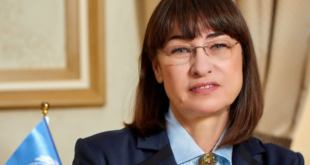Amina Khairy*
Once again, fake news is under the spotlight. Even though the world wakes up every day and goes to sleep every night after devouring enormous amounts of it. When a study sends out the alarm that fake news is ruining the world, people all too often simply stop briefly to read the findings and then go back to the same fake news.
A friend who holds a BSc in mechanical engineering and has worked in Egypt, Saudi Arabia, the UK and other countries, called last week to comment upon research released by IPSOS; a European market-research company, about fake news.
My friend has always held the view that one of the major problems in the Arab world, especially Egypt, is that the majority of people do not double-check the credibility of news circulated on social media. They either “like” it or “hate” it instead.
He went on about how the study had proved his point, to which I also adhere. He said that almost all Internet users have fallen victim to fake news at one point or another, and that some of them may do so every day.
We agreed that social media has extremely positive and extremely negative effects. Fake news circulated on Facebook, Twitter, and so on is ruining our world. But this is what we say every time we talk; even if this time the IPSOS research findings supported our conversation.
The Centre for International Governance Innovation (CIGI)-IPSOS Global Survey, in partnership with the United Nations Conference on Trade and Development (UNCTAD) annual survey of Internet security and trust in countries across North America, Latin America, Europe, the Middle East, Africa and the Asia-Pacific regions has now told us that social-media companies are second only to cyber-criminals when it comes to fuelling online distrust.
Almost 75 per cent of those surveyed cited Facebook, Twitter, and other social-media platforms as contributing to the lack of trust on the Internet.
The survey found that a majority admitted to falling for fake news at least once, citing Facebook as the leading source, and said that it wanted both governments and social-media companies to take action to halt it.
However, there was no mention of whether “netizens” (citizens of the Internet) should exert some sort of effort to double-check the information available to them, question the opinions expressed on social media, or seek out more than one credible source of information before they make up their minds.
A few minutes after my friend called, I was on Facebook and ran into a post that he had shared claiming that the government was forcing employees into early retirement in order to reduce expenditure and how this was going to affect millions of families and drive them below the poverty line.
It would lead to more and more children quitting school in order to find jobs to help their parents, and rates of crimes would also increase, it said.
At the end of the post, I found that my friend had copied it from another friend who had shared it from another who in turn had found the information trending on Twitter.
What is interesting here is not that this “news” turned out to be just one of the millions of rumours that circulate around us every day, including at weekends and national holidays, but that the post had been copied and shared by the same person who had been lecturing me about the fatal effects of fake news only a few minutes before.
A few days ago, the Ministry of Interior said that between four and six million fake accounts on Facebook were spreading rumours in Egypt. It was also only a few months ago that the foreign media published articles saying Egypt was cracking down on innocent people whom it said had been spreading fake news.
Egypt’s attempts at curtailing fake news have been seen as a crackdown on freedom of expression or a weapon to crush dissent in the foreign press in recent years.
This is not to say that we do need a larger margin of freedom, a wider scope for expression, and a real political life for democracy to thrive.
However, acknowledging our need for a wider spectrum of opinion does not mean that we do not have the right to face up to fake news.
We can argue about how this might best be done, but asking us to turn a blind eye, or considering those who make up fake news as “activists” “revolutionaries”, or “victims”, is simply not acceptable.
It is also worth mentioning that when people around the world accuse their “enemies” of spreading fake news, this is often viewed as perfectly acceptable, and there is no implication that they are obsessed with an imaginary conspiracy being planned against them.
One third of the people surveyed by IPSOS pointed to the US as the country most responsible for the disruptive effects of fake news in their country. The US was followed by Russia, seen as the second country most responsible for the disruptive effect of fake news. China came third.
It was interesting to see how politics affected people’s views of other countries. Internet users in Canada (59 per cent), Turkey (59 per cent), and the United States (57 per cent) were most likely to say that the US was the most responsible for the disruptive effect of fake news.
Equally interesting were the results from Great Britain (40 per cent) and Poland (35 per cent), where users said that Russia was most responsible for the disruptive effect of fake news. Internet users in Hong Kong (39 per cent), Japan (38 per cent) and India (29 per cent) blamed China.
Politicising fake news is only natural. However, despite political differences there are ways to minimise the negative effects of it other than by censorship and/or by blocking the Internet itself.
One success story comes from the US, where according to a survey conducted by the US Pew Research Centre in March large majorities in the Republican and Democratic Parties say that fake news has led them to check the facts in news stories and take action about them.
These actions varied from checking the facts themselves, to stopping getting news from a specific outlet, to changing the way they used social media, to reducing the amount of news they read overall, to reporting or flagging a story they thought was made-up.
But there is also a responsibility on Facebook, Google and Twitter, in other words those who invented these tools for social empowerment and knowledge transmission, to control the fake news that can spread chaos.
Indeed, a few days ago the European Union issued a report asking the three major social-media platforms to revamp their efforts to fight fake news.
Their efforts at fighting fake news ahead of the EU elections last month were acknowledged, but “more needs to be done,” it said.
The statement referred to the “Russian” element in disinformation, showing once again that accusations of spreading fake news are highly politicised.
I cannot help but remember the Internet militias that spread over the social-media platforms after the 2013 Revolution in Egypt.
Thousands of pages, in addition to millions of posts and tweets, were made up in an attempt to save the Muslim Brothers. When the latter realised that this was not possible, the electronic militias were unleashed in an attempt at ruining Egypt by spreading all sorts of fake news.
Such campaigns were met by massive denials from the major western media outlets.
In its statement, the EU said that in the days preceding the European Parliament elections at the end of May more than 600 groups and Facebook pages across Germany, France, Italy, the UK, Poland and Spain were reported to have spread disinformation.
These pages generated 763 million user views.
We must rely on the awareness and good sense of users, and not on their political or ideological views, when they go onto social media and swim in the oceans of fake news.
*The writer is a journalist at Al-Hayat.
From: Al-Ahram Weekly






